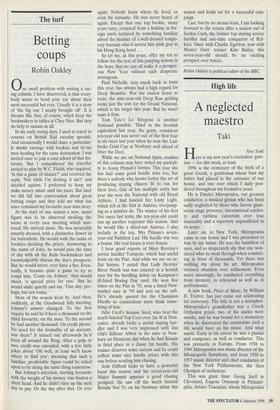High life
A neglected maestro
Taki
1996 is the centenary of the birth of a great Greek, a gentleman whose bust my father had placed in the entrance of our house, and one over which I daily pon- dered throughout my formative years.
He is Dimitri Mitropoulos, our greatest conductor, a musical genius who has been sadly neglected by those who favour glam- orous stage presence, international celebri- ty and ruthless careerism over true musicality and a repertory unparalleled in its scope.
Later on, in New York, Mitropoulos came to our house and I was presented to him by my father. He was the humblest of men, and so desperately shy that one won- dered what he went through when conduct- ing in front of thousands. Yet there was nothing shy about his art. Mitropoulos stressed abandon over refinement. Even more amazingly, he conducted everything from memory, in rehearsal as well as in performance.
A new book, Priest of Music, by William R. Trotter, has just come out celebrating his centenary. The title is not a metaphor. Mitropoulos's grandfather was a Greek Orthodox priest, two of his uncles were monks, and he was bound for a monastery when he discovered the constraints such a life would have on his music. And what music. Early in his career he was a pianist and composer, as well as conductor. This was primarily in Europe. From 1938 to 1949 Mitropoulos was music director of the Minneapolis Symphony, and from 1950 to 1957 music director and chief conductor of the New York Philharmonic, the then Olympus of orchestras.
This was giant time: Georg Szell in Cleveland, Eugene Ormandy in Philadel- phia, Arturo Toscanini, whom Mitropoulos succeeded, in New York. Mitropoulos was saintly in his attitude towards his orchestra, and was taken advantage of as a result. His uncanny ability to cite rehearsal cues with- out recourse to a score must have hit a raw nerve in lesser men. Like Leonard Bern- stein, for example.
Bernstein was Salieri to Dimitri's Mozart. A sometime protégé of the Greek, Bernstein repaid the debt in 1948 by revealing Mitropoulos's homosexuality to Serge Koussevizky, a homophobe, and the departing director of the Boston Sympho- ny, a post Dimitri craved. (In any case, the Judas did not get the job. Charles Munch did.) But Mitropoulos was no drag-ass queen a la Lenny Bernstein. He sublimated his sexuality to his music, and outside of his art he read voraciously — he would read Thomas Mann and Proust while waiting for the start of a concert, climbed mountains for exercise and lived the most Spartan of lives. Although the author only hints at it, Bernstein had it in for the saintly genius because Mitropoulos had rejected a crude pass by the American.
Bernstein married a Chilean beauty, but the marriage was a mockery. While Mitropoulos pondered Kierkegaard, Lenny cruised. Both were extremely musical, but in the end the careerist celebrity won through. He replaced Mitropoulos as direc- tor of the New York Philharmonic in 1957. Without doubt, this shortened Dimitri's life. Two and a half packs of cigarettes per day did not help. He dropped dead while rehearsing in La Scala in 1960. This hum- blest of men, this most generous of human beings, Greece's greatest musical genius along with Callas, has never had his due. Bernstein went on to preen all over the place, even gave a cocktail party to cele- brate Black Panthers killing cops, and this grates.
Now, with his centenary, he is back in my thoughts as well as in the nostalgic evoca- tions of my youth. His bust is always there, and because of him I learned early on to get pleasure from divine music. And this is what it's all about. I learned the values of European civilisation — as in Mitropou- los's interpretations of the greats — rather than the material barbarisms served up throughout the world today.
The scheming braggart Bernstein may be the bigger of the two at present, but Mitropoulos will live for ever where true music lovers are concerned. It is the differ- ence between the low blow and the bon mot.



















































 Previous page
Previous page